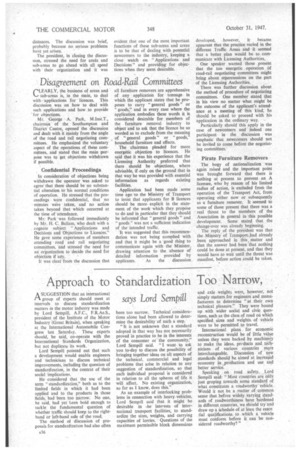Disagreement on Road-Rail Committees
Page 46

If you've noticed an error in this article please click here to report it so we can fix it.
CLEARLY, the business of areas and sub-areas is, in the main, to deal with applications for licences. This discussion was on how to deal with such applications and how to provide 'for objections.
Mr. -George A. Park, M.Inst.T., chairman of the Southampton and District Centre, opened the discussion and dealt with it mainly from the angle of the road and rail negotiating committees. He emphasized the voluntary aspect of the operations of these committees, and stated that the main purpose was to get objections withdrawn if possible.
Confidential Proceedings
In consideration of objections being withdrawn the operator was asked to agree that there should be no substantial alteration to his normal conditions of operation. He stressed that the proceedings were confidential, that no • minutes were taken, and no action taken beyond that which occurred at the time of attendance.
Mr. Park was followed immediately by Mr. H. C. Ballam, who dealt with a cognate subject Applications and Decisienis and Objections to Licences." He gave some experiences of members attending road and rail negotiating committees, and stressed the need for an organization to decide the need for objection if arty.
It was clear from the discussion that all furniture removers are apprehensive of any application for tonnage in which the applicant states that he proposes to carry " general goods" or "goods," and in every case where the application embodies these words it is considered desirable for members of the furniture removal industry to object and to ask that the licence be so worded as to exclude from the meaning of "general goods" or "goods," household furniture and effects.
The chairman pleaded for more energetic objection to licences. He said that it was his experience that the Licensing Authority preferred that there should be objections, where advisable, if only on the ground that in that way he was provided with essential information as regards existing facilities.
Application had been made some time ago to the Ministry of Transport to insist that applicants for B licences should be more explicit in the statement of the work which they propose to do and in particular that they should be informed that "general goods" and " goods " was not a sufficient indication of the intended traffic.
It was suggested that this recommendation was not being complied with and that it might be a good thing to communicate again with the Minister, drawing attention to the 'absence of detailed information provided by applicants. As the discussion developed, however, it became apparent that the practice varied in the different Traffic Areas and it seemed that a better plan would be to communicate with Licensing Authorities, One speaker warned those present that the too energetic operation of road-rail negotiating committees might bring about repercussions on the part of the Licensing Authorities.
There was further discussion about the method of procedure of negotiating committees. One member stated that in his view no matter what might be the outcome of the applicant's attendance at a meeting of this kind, he should be asked to proceed with his application in the ordinary way.
Particularly should this apply in the case of newcomers and indeed one participant in the discussion was emphatic that newcomers should not be invited to come before the negotiating committees.
Pirate Furniture Removers
The bogy of nationalization was again raised and the important point was brought forward that there is nothing at present to prevent an A licensee, who by reason of his limited radius of action, is excluded from the operation of the Transport Act, from operating either now or subsequently as a furniture remover. It seemed to some of those present that there was a real threat to the members of the Association in general in this possible development. Some stated that the change-over was already beginning. The reply of the president was that the -Miuistry of Transport,.had already been approached in this matter and that the answer had been 'that nothing could be done at present, and that they would have to wait until the threat was manifest, before action could be taken.












































































